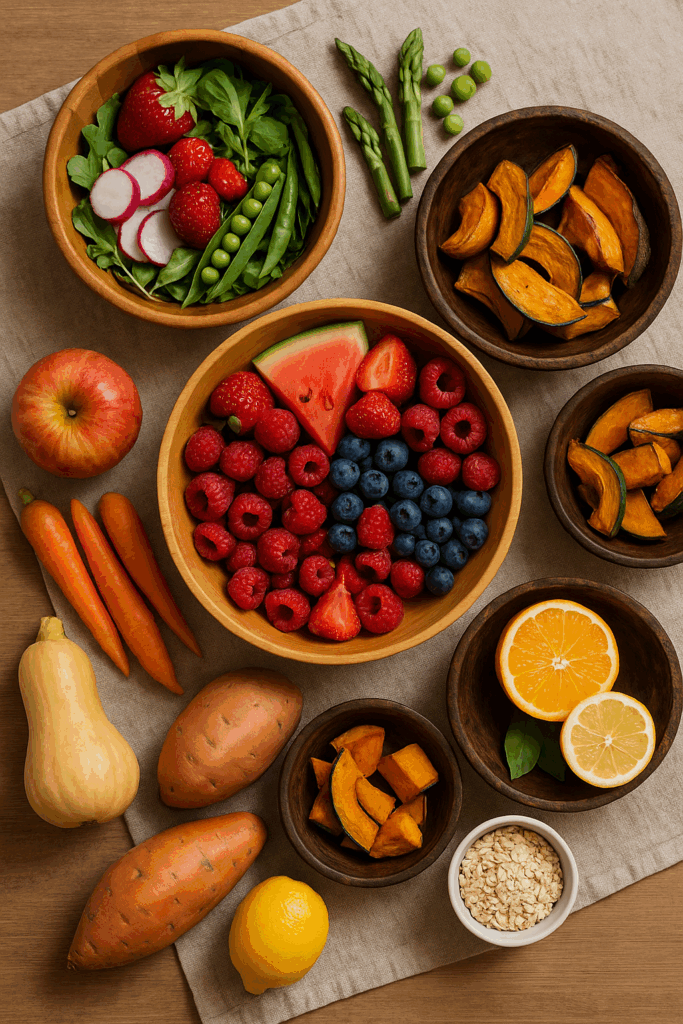Food isn’t just fuel—it’s energy, vitality, and connection to the seasons around us. As the weather shifts, so do our bodies’ needs. Nature provides what we need in each season, and when we eat in harmony with it, we can feel more energized, balanced, and resilient.
Seasonal nutrition isn’t a trend; it’s a way of living in sync with the natural rhythm. From bright summer berries to grounding autumn root vegetables, the foods available each season are packed with nutrients designed to support our health in that exact moment. In this post, we’ll explore how seasonal eating can boost your energy, what foods to focus on each season, and practical tips to make it simple and enjoyable.
Why Seasonal Nutrition Matters
Have you ever noticed how watermelon tastes best in summer, or how a warm bowl of soup feels perfect in winter? That’s seasonal nutrition at work. Eating seasonally has multiple benefits:
- Higher Nutrient Density: Foods harvested at their peak have more vitamins, minerals, and antioxidants.
- Better Flavor: Fresh, local produce tastes richer and more vibrant.
- More Energy: Seasonal foods align with your body’s needs—hydrating fruits in summer, warming roots in fall, vitamin C–rich citrus in winter.
- Sustainability: Choosing seasonal produce often means supporting local farmers and reducing environmental impact.
Energizing Foods by Season
🌸 Spring: Renewal and Lightness
Spring is all about fresh starts. After a heavy winter, our bodies crave lighter, detoxifying foods that boost energy and digestion.
Energizing Spring Foods:
- Leafy greens (spinach, kale, arugula, dandelion) to cleanse and refresh
- Asparagus and peas for fiber and vitamins
- Strawberries and rhubarb for antioxidants
- Fresh herbs like parsley, dill, and mint for flavor and digestion
Nutrition Tip: Start your day with a green smoothie or add fresh herbs to every meal. These light foods support liver detoxification and energize you for longer days.
☀️ Summer: Hydration and Vitality
Long days and hot weather mean our bodies need hydration and cooling nutrients. Summer produce is water-rich and packed with antioxidants that protect us from sun stress.
Energizing Summer Foods:
- Berries (blueberries, raspberries, blackberries) for antioxidants
- Watermelon, cucumbers, and tomatoes for hydration
- Zucchini and peppers for vitamins C and A
- Fresh corn for fiber and slow-release energy
Nutrition Tip: Build rainbow-colored plates. The more color variety, the more antioxidants. Think salads, smoothies, and grilled veggie platters.
🍂 Autumn: Grounding and Warmth
As the air cools, our bodies crave comfort and stability. Autumn foods are grounding, rich in fiber, and full of slow-release energy to prepare us for shorter days.
Energizing Autumn Foods:
- Root vegetables (carrots, beets, sweet potatoes) for steady energy
- Squash and pumpkin for fiber and beta-carotene
- Apples and pears for antioxidants and gut health
- Nuts and seeds for healthy fats and minerals
Nutrition Tip: Roast root vegetables with warming spices like cinnamon, nutmeg, or turmeric. These not only taste delicious but also support circulation and immunity.
❄️ Winter: Strength and Immunity
Winter is about nourishment and protection. Foods harvested in this season help strengthen immunity and keep energy steady despite cold, dark days.
Energizing Winter Foods:
- Citrus fruits (oranges, grapefruits, lemons) for vitamin C
- Cabbage, kale, and Brussels sprouts for antioxidants
- Lentils and beans for protein and iron
- Oats and whole grains for sustained energy
Nutrition Tip: Focus on warm, slow-cooked meals like soups and stews. Add garlic, ginger, and onions for extra immune support.
How Seasonal Nutrition Boosts Energy
- Balances Blood Sugar: Seasonal produce tends to be naturally aligned with your body’s needs—fresh fruits for quick energy in summer, fiber-rich roots in fall to prevent crashes.
- Supports Digestion: Eating what’s fresh helps your gut microbiome thrive, giving you better nutrient absorption and more energy.
- Protects Immunity: Each season’s foods come with immune-supporting properties—like vitamin C in winter citrus or antioxidant-rich berries in summer.
- Aligns with Circadian Rhythms: Seasonal eating supports your body’s natural rhythm of energy peaks and rest.
Practical Tips for Seasonal Eating
- Shop Local: Farmers’ markets and local produce sections are the easiest way to see what’s in season.
- Cook Simply: Roasting, steaming, and raw salads bring out natural flavors. No need for complicated recipes.
- Rotate Foods: Eating the same thing all year can lead to nutrient gaps. Seasonal eating ensures variety.
- Preserve the Season: Freeze berries, make soups, or store root veggies so you can enjoy seasonal goodness longer.
- Listen to Cravings: Your body often knows what it needs—lighter meals in spring, heartier ones in winter.
Seasonal Nutrition in Everyday Life
Imagine this:
- In spring, you wake up with a fresh green juice, feeling lighter after months of heavier foods.
- In summer, you pack a hydrating berry smoothie for your afternoon energy boost.
- In autumn, you roast pumpkin and sweet potatoes, fueling yourself with grounding energy.
- In winter, you cozy up with a lentil soup rich in garlic and lemon to strengthen your immunity.
This isn’t about strict rules—it’s about aligning with nature and giving your body what it naturally thrives on.
Energizing Habits Beyond Food
Nutrition is key, but energy also comes from lifestyle choices:
- Hydration: Even slight dehydration can drain energy. Pair seasonal foods with plenty of water or herbal teas.
- Movement: Gentle seasonal exercise—walks in spring, swims in summer, hikes in autumn, yoga in winter—keeps energy flowing.
- Rest: Seasonal rhythms influence sleep. Prioritize rest during winter and embrace early morning light in summer.
Final Thoughts
Seasonal nutrition is about more than eating what’s available—it’s about living in harmony with the rhythms of nature. Each season brings foods that energize, balance, and nourish us in exactly the way we need.
By embracing seasonal nutrition, you’ll not only feel more vibrant but also deepen your connection to your environment, your health, and yourself. Energized, resilient, and in tune with the seasons—you’ll discover that food truly is one of the simplest ways to live well.
